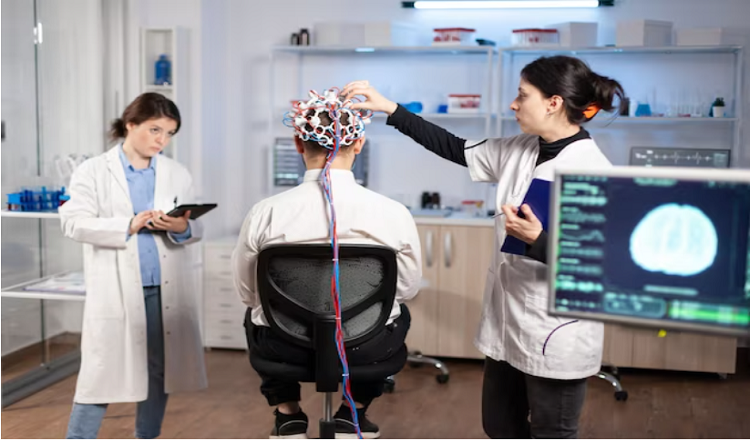Artificial Intelligence (AI) and Machine Learning (ML) are revolutionising the way we practise medicine and are no longer simply industry buzzwords. AI and ML are enhancing the effectiveness, accuracy, and personalization of healthcare across diagnostics and treatment options. But let’s face it, we have all seen science fiction films where robots do surgical procedures and AI takes over the world. But relax, we haven’t arrived yet.
Large volumes of data are being analysed in order to find patterns that would be impossible for people to find on their own. This may lead to more effective and accurate diagnoses as well as novel therapeutic possibilities. In particular, the application of AI in medical imaging, such as X-rays, CT scans, and MRI, is demonstrating considerable promise in the early and accurate diagnosis of diseases. In order to expedite the delivery of new medications to patients, AI and ML are also being utilised in drug development and clinical trial optimisation. However, it’s crucial to think about the potential hazards and ethical ramifications as with any new technology. In this post, we’ll examine how AI and machine learning are improving healthcare and the significance of responsible deployment.
Best in Class
AI’s Use in Diagnostics
One of the most exciting applications of these technologies in healthcare is the use of AI and ML in diagnosis. Medical photos are one type of data that AI and ML systems can analyse in depth to find patterns that would be impossible for humans to see on their own. This can increase the effectiveness and accuracy of diagnostic procedures and perhaps aid in the earlier detection of diseases.
To identify symptoms of diseases like cancer, heart disease, and lung disease, AI-powered image recognition can be used to analyse medical pictures like X-rays, CT scans, and MRIs. Similar to the analysis of speech patterns, Parkinson’s disease symptoms can be detected using AI-powered speech recognition.
By offering a second view or highlighting areas of concern on an image, AI and ML can also be utilised to help medical personnel in the diagnostic process. In summary, AI and ML are transforming the diagnostics industry by making it more effective, accurate, and accessible while also assisting in bettering patient outcomes.
AI’s Use in Healthcare
Another area where AI and ML are demonstrating considerable promise in healthcare is in the field of treatment. Large amounts of data can be analysed using AI and ML to find trends and offer individualised treatment alternatives. A patient’s medical history, genetics, and other data, for instance, can be examined using AI-powered personalised medicine to determine the best course of therapy. Better patient outcomes and more efficient therapies may result from this. Analysing data from earlier clinical trials and finding potential new targets for drug development are two ways that AI and ML can be employed in the drug-development process.
By offering real-time decision support, spotting possible problems, and keeping an eye on patients’ situations, AI and ML can also help medical practitioners treat patients. In summary, AI and ML are transforming the medical industry by making it more individualised, effective, and efficient while also assisting in bettering patient outcomes.
AI’s Role in Medical Research
One area where AI and ML are demonstrating considerable promise is in the field of medical research. Medical research can be accelerated by using AI and ML to analyse vast amounts of data and find trends.
Drug discovery can be accelerated and made more effective by using AI and ML to analyse data from prior clinical trials and find potential new targets for drug development. By selecting the most promising applicants for a trial and forecasting the results, AI and ML can also be used to optimise the design of clinical trials.
The analysis and interpretation of data can be aided by AI and ML, which can also be used to discover crucial results and provide real-time insights. In brief, AI and ML are revolutionising the area of medical research by accelerating the discovery of novel medicines and cures and making it faster, more efficient, and more successful.
Conclusion
The healthcare sector is being transformed by AI and ML by making it more effective, precise, and individualised. These technologies are opening up new possibilities to enhance patient outcomes, from diagnostics to available treatments. Early and accurate disease detection is made possible by the use of AI in diagnostics, and more individualised and efficient therapy choices are made possible by the use of AI in treatment.
Additionally, AI and ML are being applied to medical research to hasten the creation of novel therapies and treatments. However, it’s crucial to think about the potential hazards and ethical ramifications as with any new technology.
As a result, when applying AI to healthcare, it’s crucial to give ethical considerations, data privacy, and security a priority. In order to make sure that technology is being produced for the benefit of the public and to handle any potential concerns, it is crucial to continue investing in research and development. To make sure that AI and ML are being used for the good of humanity as they continue to play a larger role in healthcare, it’s critical to be informed and be aware of the potential benefits and concerns.
Read More You May Like:
- AI in Financial Services: How Machine Learning is Transforming Investment and Banking
- AI in Education How Machine Learning is Changing the Way We Learn
- AI and the Future of Work: How Will Automation Impact the Job Market?
- AI and the Future of Transportation The Rise of Self-Driving Cars and Drones
- AI and Cybersecurity: How Machine Learning is Being Used to Fight Cybercrime




